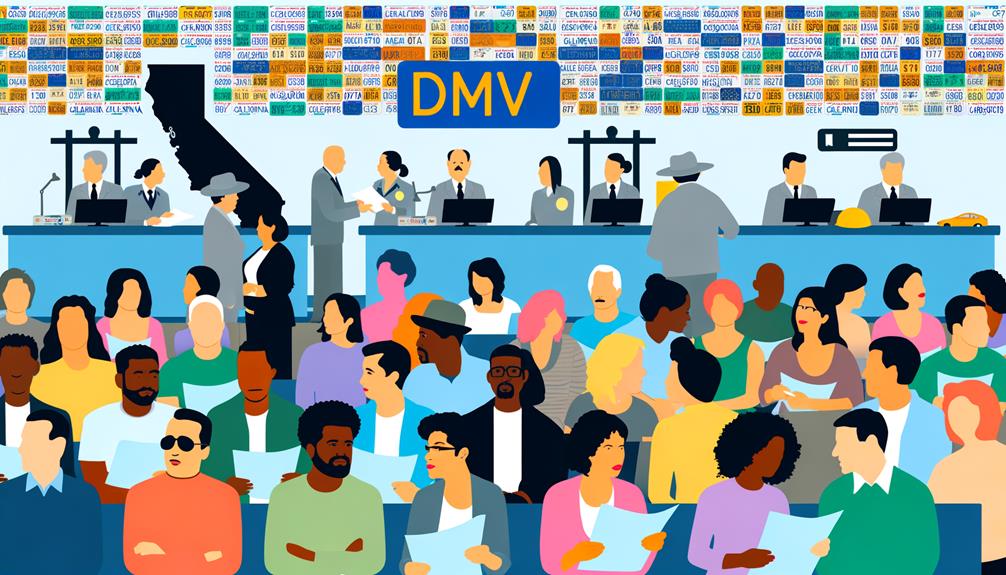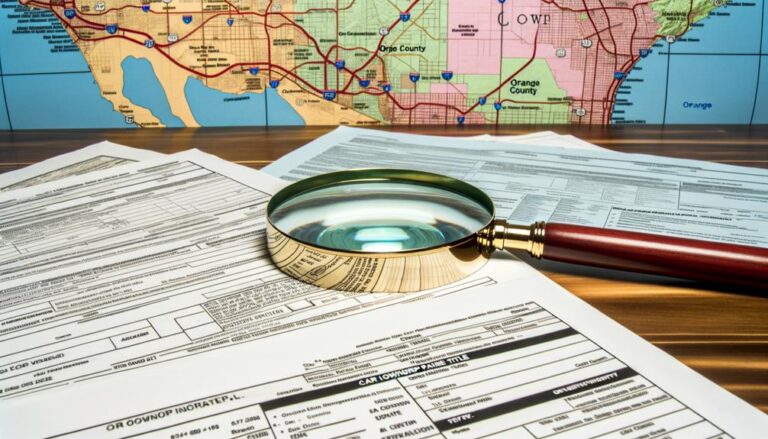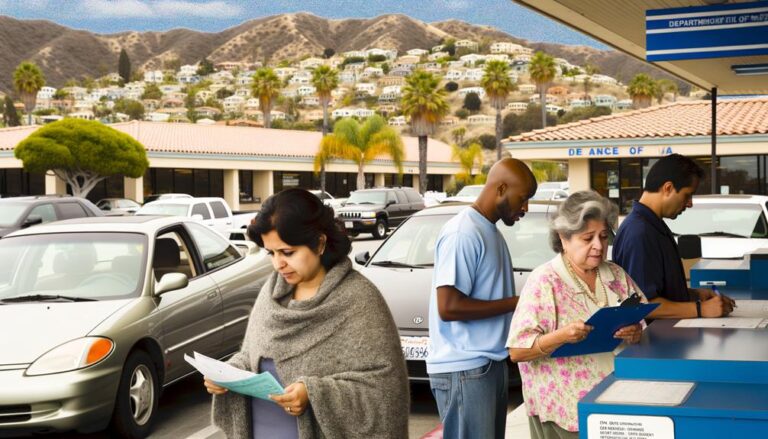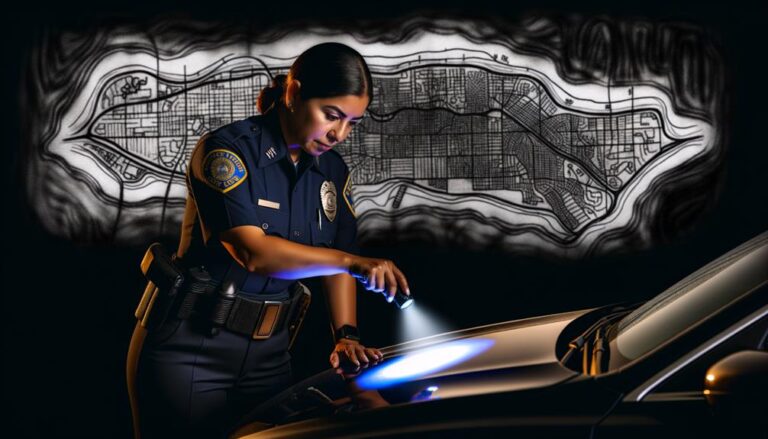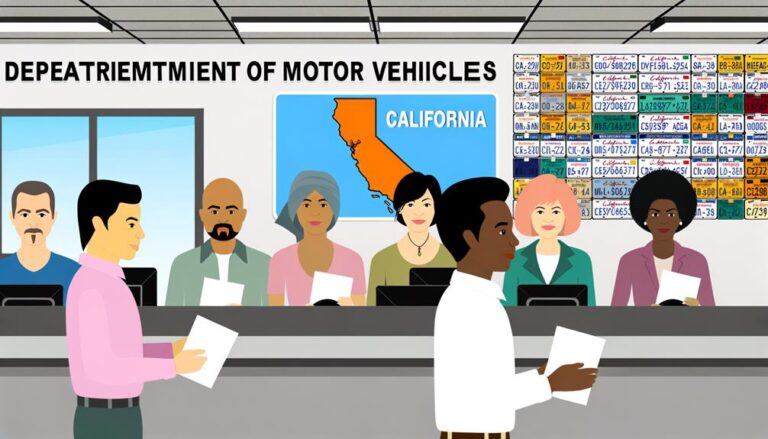When you're registering your out-of-state car in California, you'll encounter challenges like mandatory smog checks and VIN inspections. You'll need to complete and sign the Application for Title or Registration (REG 343) and gather necessary documents such as your out-of-state title and registration, smog certification, VIN verification form, valid driver's license, and proof of insurance. Visit the DMV in person with the original documents for verification. Keep track of registration fees, which include a car purchase tax and potentially higher fees for commercial vehicles. Address any existing violations like unpaid tickets to avoid complications. Exploring further will uncover more about simplifying this process.
Understanding DMV Requirements
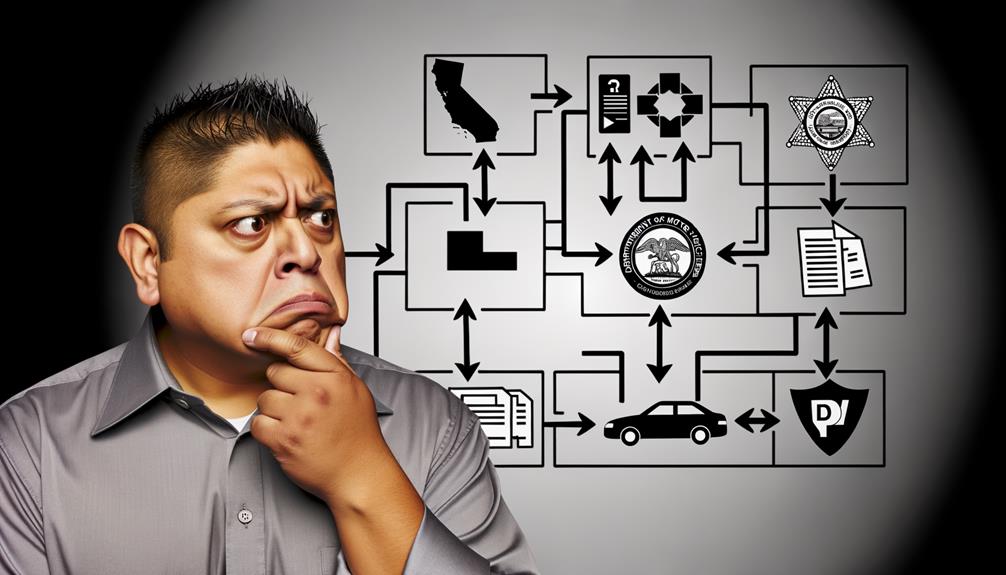
To successfully register your out-of-state car in California, you must first navigate the specific requirements set by the Department of Motor Vehicles (DMV).
Start by completing a VIN inspection, which verifies your vehicle's identity. This process is crucial to ensure the car meets California's standards and helps prevent issues related to fraud or theft.
Next, unless your ride is exempt, you'll need to have a smog check done. Remember, exemptions include cars like those from 1975 or earlier, diesels from 1997 or older, and electric vehicles.
Following the inspection, fill out the Application for Title or Registration (REG 343). It's vital that all title owners sign this form to validate it.
When gathering your paperwork, include your latest out-of-state title and registration, the smog certification (if applicable), a completed VIN verification form, a valid driver's license, and proof of insurance meeting California's requirements.
An in-person visit to the DMV is mandatory for first-time registration. You must bring all original documents for verification.
To streamline this process and respect your time, it's wise to schedule an appointment. This step ensures you're not stuck waiting, reinforcing your freedom to manage your time effectively while complying with regulatory necessities.
Managing Registration Fees
Navigating California's vehicle registration fees requires understanding several critical factors that directly influence the total cost. When you're considering registering your out-of-state car, you'll encounter various fees that can significantly affect your budget.
The initial car purchase tax in California stands at 7.5%, but with local sales taxes, this figure can rise to about 10%. This high rate directly boosts your overall registration fees. Additionally, if your vehicle is a commercial model or has significant weight, you may face higher registration fees due to the commercial vehicle weight fees or the power motive impact.
Moreover, should you delay your car registration, the California DMV imposes stringent penalties. A 40% penalty applies to the license fee for registrations less than one year late, escalating to 80% for delays exceeding one year. To avoid these hefty fines and manage your expenses effectively, it's crucial to act promptly and understand the full scope of potential costs.
You might also contemplate keeping your out-of-state title and registration in a state like South Dakota, where the sales tax is lower and no inspections are required, potentially saving you thousands in registration costs.
However, utilizing the California DMV fee calculator is advisable for precise estimations. Input your vehicle type, model year, and motive power to get an accurate figure of what you'd need to pay if you choose California registration.
Ensuring Emissions Compliance
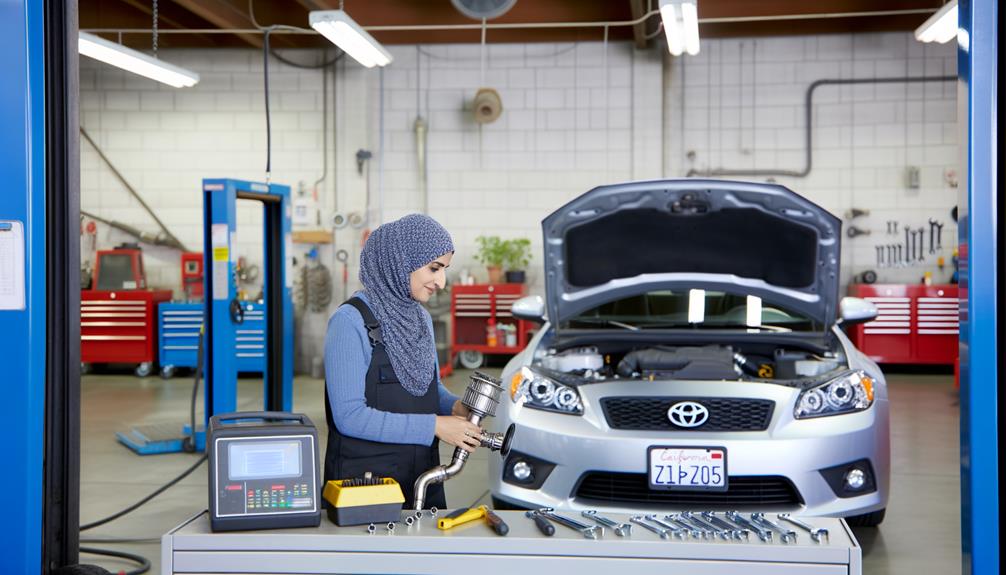
After addressing the financial aspects of registering your out-of-state vehicle in California, it's equally important to consider the environmental regulations you must meet.
Ensuring your vehicle complies with California's emissions standards is crucial for successful vehicle registration. The state mandates a smog check for most vehicles to assess compliance with air quality standards. Remember, if your car is from 1975 or older, or certain newer diesel models and electric vehicles, you're exempt from this requirement.
Approximately 10% of vehicles fail their initial smog checks annually. If yours is among them, you'll face additional repair costs and a delay in your registration process.
It's wise to budget around $34.99 for the test, though prices may vary based on location and provider. Should your vehicle fail the smog check, repairs must be completed before proceeding with registration.
In cases where immediate repair isn't feasible, a Temporary Operating Permit, costing $50, may be issued to allow you some breathing room.
Handling Existing Violations
Before you proceed with registering your out-of-state vehicle in California, make sure to clear up any existing violations.
Handling existing violations efficiently is key to avoiding unnecessary complications and expenses during your car registration process. Here's what you need to address:
- Unpaid Tickets: Check for any outstanding traffic or parking tickets. Unpaid tickets can escalate to vehicle impoundment or additional fees, complicating your registration efforts. Visit the DMV website to search for any violations under your vehicle's identification number.
- Parking Violations: Similarly, unresolved parking violations must be dealt with promptly. Neglect can lead to increased penalties and affect your credit rating or driving privileges.
- Toll Violations: Communicate with toll authorities to resolve any unpaid tolls. Ignoring toll payments can accumulate significant fees and may lead to collections through the California Franchise Tax Board if unresolved for over six months.
- Smog-Related Violations: If you're facing a smog test failure, consider applying for the financial assistance program which offers up to $500, alleviating some of the financial burden and helping you comply with state requirements.
Document Preparation Tips
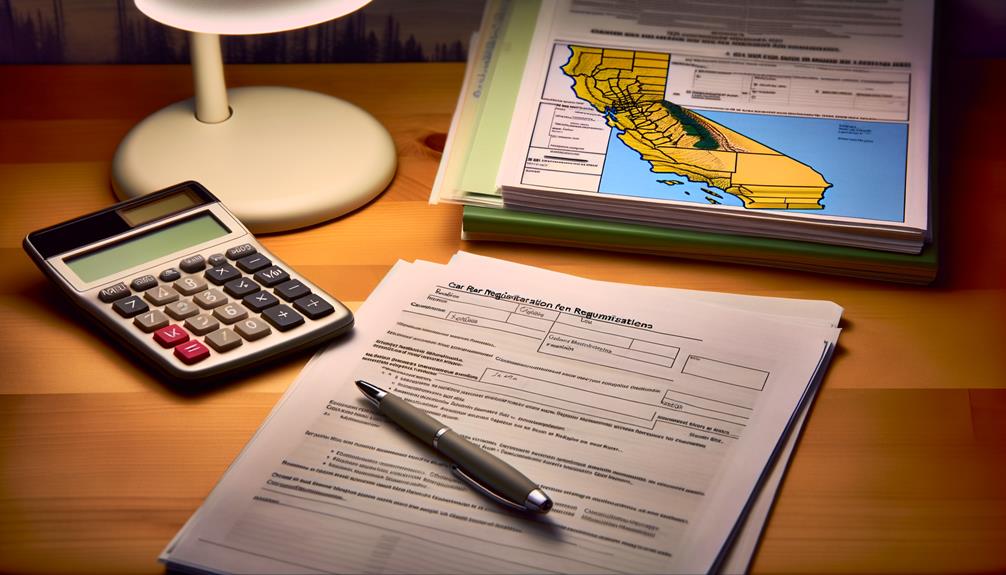
To ensure a smooth transition during your out-of-state car registration in California, start by gathering the necessary documents.
You'll need your current out-of-state title and registration as proof of ownership. If these documents are missing, immediately contact the previous state's DMV for copies. This step is crucial to avoid delays in your California registration process.
Next, complete the Application for Title or Registration (REG 343). Ensure all title owners sign the application accurately and completely. This preparation is key to a seamless registration process when you're at the DMV.
Don't overlook the smog certification. Unless your car is from 1975 or earlier, California requires a smog check from an authorized station. This document confirms your vehicle meets state emissions standards, a non-negotiable in the registration process.
Additionally, a VIN verification is mandatory. You can complete this at a local DMV, law enforcement office, or a licensed private company. Having this form ready will streamline your visit.
Communicating With DMV Representatives
When you approach DMV representatives, ensure your documents are meticulously organized, including your out-of-state title, registration, the completed Application for Title or Registration (REG 343), and proof of insurance. Doing so is crucial to facilitate a smoother interaction and demonstrate your readiness.
As you go to the DMV to register a car, make sure to:
- Clearly articulate your situation: Explain that you're registering an out-of-state vehicle. This helps the representative understand your specific needs quickly.
- Ask for clarification politely: Should any confusion arise, it's okay to ask detailed questions to avoid misunderstandings that could delay your registration.
- Utilize online resources beforehand: Familiarize yourself with the registration process through the DMV website to discuss your case more effectively.
- Track all interactions: Keep a record of whom you speak with and what was discussed, in case you need to reference these details later or escalate an issue.
Being prepared and organized not only shows that you respect the process but also empowers you to navigate it more freely and effectively, ensuring your license and vehicle registration are handled efficiently.
Avoiding Common Mistakes
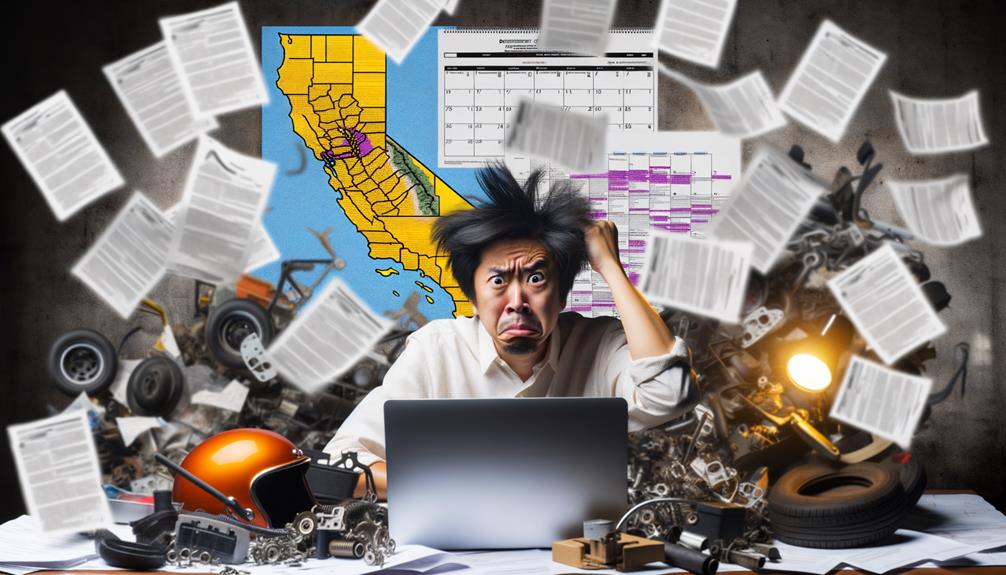
Registering your out-of-state car in California can be straightforward, but common pitfalls could complicate the process. To ensure a smooth transition, it's crucial you don't miss any steps.
First, verify that all title owners have signed the Application for Title or Registration (REG 343). Missing signatures can halt your registration efforts at the DMV, leading to unnecessary delays.
Next, don't overlook the smog check requirement. Unless your vehicle is exempt, completing a smog check before attempting registration is essential. Failing this step will prevent you from registering your vehicle. Always check if your vehicle falls under any exemption categories to save time and effort.
Furthermore, gather and double-check all necessary documentation before your appointment. This includes the original out-of-state title, proof of insurance from a California-licensed provider, and a completed VIN verification form. Having these documents ready will streamline the registration process.
Lastly, schedule your DMV appointment online and aim to arrive early. Being punctual helps ensure that you can complete your registration within the stringent 20-day window after your move.
Also, familiarize yourself with the potential fees using the DMV's fee calculator, as costs can vary significantly depending on your vehicle type and location.
Frequently Asked Questions
What Do You Have to Do to Register a Car From Out of State in California?
To register your out-of-state car in California, you'll need a title transfer, VIN verification, proof of residency, and to pay registration fees. Complete the necessary forms and pass the smog check if required.
How Long Can You Drive in California With Out of State Registration?
You can drive with out-of-state plates in California for up to 20 days after establishing residency. Meet these driving limits and residency requirements to avoid penalties and ensure your freedom on the road.
Do I Need a Smog Check to Register My Out of State Car in California?
Yes, you'll need a smog check to register your out-of-state car in California, unless it's a newer model or falls under specific exceptions. Be prepared for registration fees and thorough vehicle inspections.
Why Can't I Register My Car Online California?
You can't register your car online in California due to out-of-state requirements needing in-person document verification. Tackle online registration issues by preparing for your DMV appointment with all necessary documents for a smoother process.

